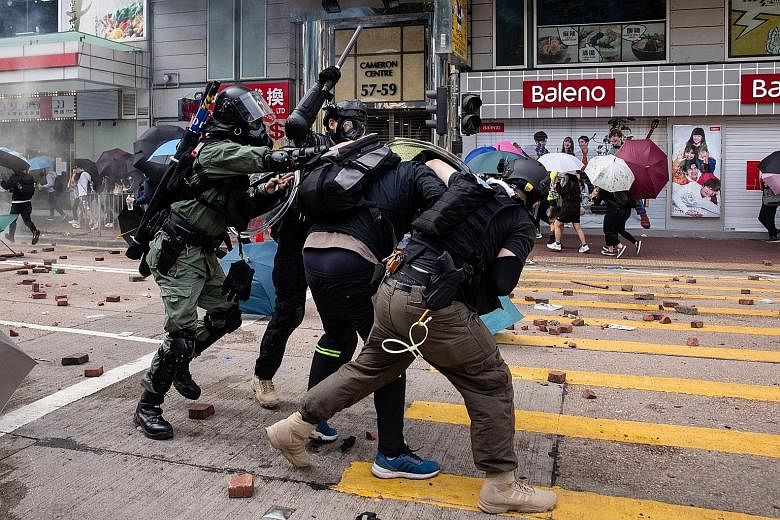LONDON• • Investors may be divided on the scope of the threat posed by escalating protests in Hong Kong, but there is growing evidence that money managers are starting to rethink their positions. Here is what fund managers are saying about the protests:
"There is an increasing fear that further violence could lead to Chinese military intervention, which would create uncertainty on how the US and Europe would react." MR MALCOLM DORSON, who helps manage about US$700 million (S$952 million) of emerging-market funds at Mirae Asset Global Investments in New York.
"We care about the Hong Kong exchange being stable and open as a trading platform for Chinese securities. We care about China's reaction to Hong Kong protests and potential impact on domestic Chinese politics, or global perception of China."
MR MICHAEL REYNAL, who manages more than US$2 billion in emerging-market equities at Victory Capital Management.
"The protests in Hong Kong have taken a very violent turn, and talking to my colleagues out there gives me a sense that we are seeing a radicalisation of the protest movement, which is not widely supported."
MR LUKE HICKMORE, a London-based money manager at Aberdeen Standard Investments, which oversees US$669 billion. He closed some of his longer bets on HSBC Holdings, citing concern that the violence will erode its local clients' businesses.
"We are watching very carefully for the next steps to see if this intensifies even more. In the meantime, it is safer to be out of it and watching those developments than taking risk in HSBC on a situation that remains difficult to read. HK was a strong area of growth for them last year."
MR NICOLAS DUBUS, a Paris-based global bond fund manager at Groupama Asset Management, which oversees more than €100 billion (S$150.6 billion). He has reduced his exposure to short-duration debt because of the risk that an international flare-up could erase progress on a United States-China trade deal.
"There is a risk that any intervention from Beijing forces could lead to retaliation from the US Congress that could derail the trade truce, so I'm a bit worried for the market. I've reduced my short-duration exposure last week to a more neutral position for DM (developed markets). I still have a slightly long exposure to EM (emerging markets), mostly in hard currencies."
MR SANT MANUKYAN, a strategist at Is Investment, the brokerage unit of Turkiye Is Bankasi in Istanbul.
• "We see it as a sort of a proxy conflict between the US and China, but we think the contagion risks are still limited from a broad global perspective. We see it as a contributing factor to why we generally have disliked Asia. Although I would say that the conflict adds to the 'mini Cold War 2.0' narrative."
MR MORTEN LUND, an analyst at Nordea Bank in Copenhagen. •
"One or two holdings have some exposure to Hong Kong and have seen a slowdown in that part of their revenues, but there's no major impact. The Chinese rate cuts won't have much impact. If (and it's still a big if) they decide they want to stimulate the economy, then it will require a much more overt infrastructure plan or direct incentives."
MR IAN SIMMONS, a London-based money manager at Fiera Capital UK.
"It is unlikely that sanctions will be implemented and I believe that this situation will remain an idiosyncratic risk, carrying mainly regional implications. The market is more focused on the trade war between China and the US."
MS PAOLA BINNS, senior fund manager at Royal London Asset Management, which manages £130 billion (S$229 billion) in assets.
"In terms of price action, the events in Hong Kong have been overshadowed by (marginally) improving global growth data (particularly out of Europe), strong equities and hopes of some solution on the trade conflict between the US and China. This said, idiosyncratic developments within EM (Hong Kong, Chile or Argentina earlier this year) should keep investors aware of the risks associated with an investment in emerging markets."
MR CHRISTIAN WIETOSKA, London-based strategist at Deutsche Bank.
BLOOMBERG

